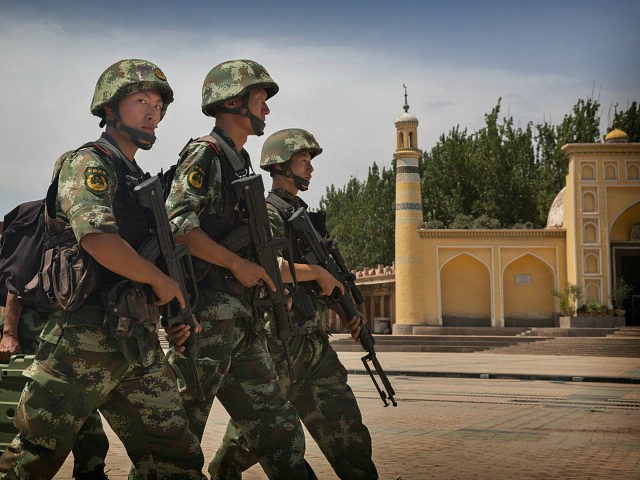Radio Free Asia (RFA) reported this week that some Uighur Muslims in China’s westernmost province of Xinjiang have accused the police of confiscating their Qurans, claiming the seminal Islamic text contains “extremist content.”
Xinjiang is home to a Uighur Muslim separatist movement and the Chinese government has previously claimed citizens from Xinjiang have left to the Middle East to join the Islamic State. In response, the Communist Party has cracked down significantly on public displays of faith, including publicly fasting during Ramadan or wearing Islamic garb on public transportation.
Radio Free Asia cites Dilxat Raxit, World Uyghur Congress spokesman, as having seen orders from police on the social media platform WeChat ordering families to hand over their Qurans and prayer mats, among other religious paraphernalia.
“All Qurans and related items must be handed into the authorities, and there are notices to this effect being broadcast via WeChat,” Raxit told the outlet. “We received a notification saying that every single ethnic Uyghur must hand in any Islam-related items from their own home, including Qurans, prayers and anything else bearing the symbols of religion … They have to be handed in voluntarily. If they aren’t handed in, and they are found, then there will be harsh punishments.”
RFA adds that sources on the ground have seen instances of confiscations involving non-Uighur Muslims in the region as well, such as Kazakh and Kyrgyz Muslims. “Officials at village, township and county level are confiscating all Qurans and the special mats used for namaaz[prayer],” a Kazakh source told the outlet.
RFA adds that officials in the region began confiscation Qurans this year, citing their “extremist content,” but had only extended the ban to Qurans published more than five years ago, attempting to replace them with government-approved copies.
The Chinese Foreign Ministry has denied the report as “groundless allegations and rumors.” Asked about claims that Chinese police were confiscating prayer materials, spokesman Lu Kang told reporters, “We hope relevant parties refrain from making groundless allegations and rumours,” adding that the situation on the ground in Xinjiang was “sound.”
On Friday, the Chinese state media outlet Xinhua published a story on life in Xinjiang not designated a response to the RFA article, but apparently meant to dispel the appearances that police did not allow Uighurs to live in their territory and practice their culture peacefully. The article, titled “Live the real life of Uygurs in a Xinjiang resort,” highlights Kazanqi, a village that allows tourists to live among the Uighur people as colleagues, eat local foods, and enjoy traditional music. The article does not mention Muslims or Islam at all, despite the fact that most Uighurs are practicing Muslims.
The Chinese Communist Party publication People’s Daily did announce this week new “security” measures for Xinjiang. The Communist Party decreed the use of “new high-tech body security scanners … to enhance counter-terrorism work.” The scanners will reportedly appear on Xinjiang’s roads and individuals will be forced to undergo routine security checks through the scanners when reaching police checkpoints on the road.
Residents of Bayingol, a prefecture of Xinjiang, must already install a GPS tracking system on their cars to ensure that police know where they are at all times, at a cost of $13 per person to the resident. Additionally, the Chinese government has severely restricted the practice of Islam throughout the state—from banning Muslim names like Muhammad” and “Arafat” to forcing shops to sell haram items such as cigarettes and alcohol—and promoted “ethnic unity” campaigns meant to dilute Uighur identity by promoting intermarriage and imposing Mandarin over the Uighur language.

COMMENTS
Please let us know if you're having issues with commenting.